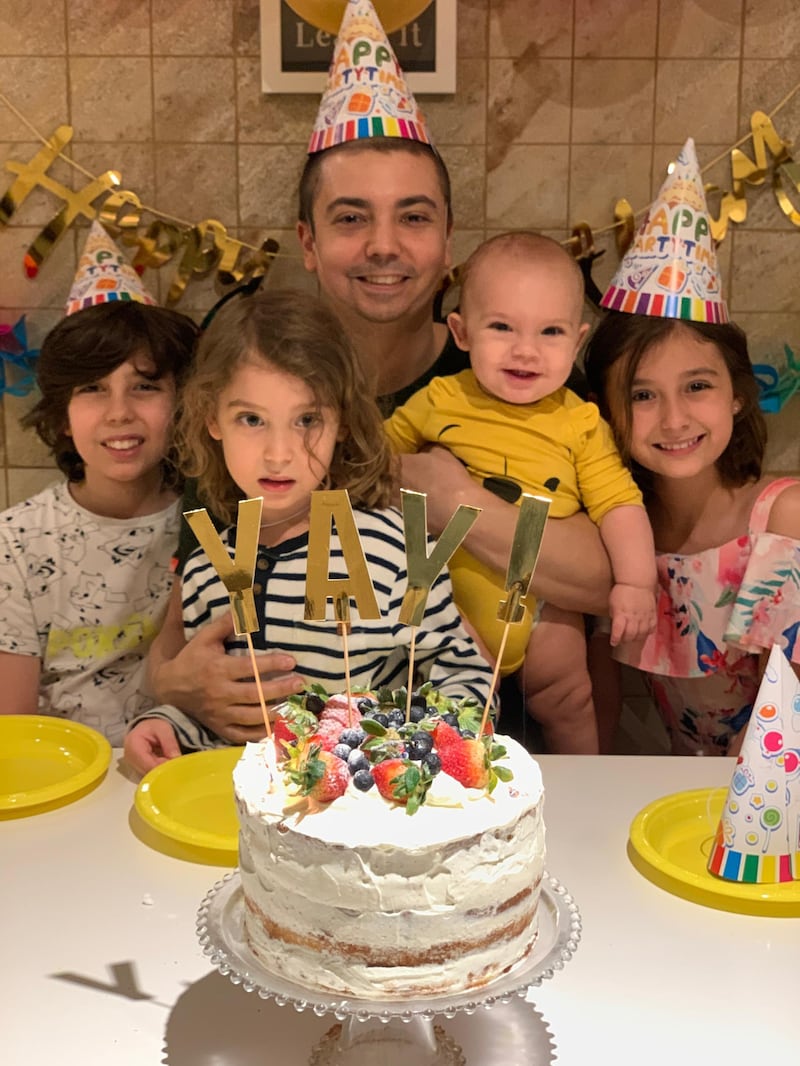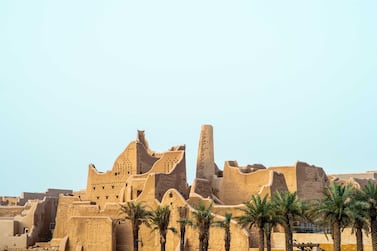Say hello to one of the Arab world’s favourite dads.
For the last nine years, Saudi online personality Mohamed Moshaya has been charming the region with videos showcasing his fun and deep bond with his four young children.
From chronicling of their trips overseas and birthday parties to playing tug of war at his Jeddah home amid the kingdom’s lockdown, to say that Moshaya’s feel good content struck a chord with the region is an understatement.
At 16.9 million subscribers, his mmoshaya page is currently the second leading YouTube channel in the Arab world – only a couple of million behind the children's online portal Toyor Al Jannah with 19.1 million subscribers.
With one billion in combined streams, such is Moshaya's clout that YouTube asked him to host the world's largest virtual iftar on Tuesday, May 19, a distinction certified by Guinness World records with 183,544 concurrent viewers.
That pioneering streak is not only told in the viewer numbers, however, Moshaya says the impact of his video interactions with 11-year-old son Anas, nine-year-old daughter Iman, five-year-old boy Yusuf and new star, the 8-month-old Jad have been felt in the homes of many fellow Saudis.
“This is really what makes me proud with what we as a family are doing,” he says.
“I get messages sometimes from people who have said that after their husbands started watching our videos, they have been going out more as a family because that’s what we do. I also had a father tell me that after watching one of our videos, he began taking his children to school, even though he has a driver. He wanted to thank me because he realised before that he was neglecting his children. The fact that our content is making people more loving is really special to me.”
A story in numbers
Moshaya's success is also the story of YouTube's increasing foothold in both the kingdom and the region.
According to a 2019 report by parent company Google, Saudi Arabia is the biggest user of YouTube per capita world-wide, while in Egypt, 77 per cent of millennials (estimated to be 37 million aged 22 to 38) watch YouTube every day.
"That’s more than any other platform, even TV," the report states in regards to Egypt.
Moshaya, whose channel is a lucrative full time pursuit, puts his fortunes down to riding that regional wave early. He recalls that back in 2010, when he began his channel while living in the UK with his wife and then one -year-old Anas, there was no such thing as an Arabic family vlogger. A tech head with a passion for filmmaking, Moshaya inadvertently fell into that space as a way combine both of his talents.
“What I am telling you now is all in hindsight of course, because I never had a plan to make a living from YouTube. It really began with me just showing people my life and what I was doing,” he says.
“But what made it different was the fact that I was doing it in Arabic. There were plenty of family vloggers in the US and none really in the Arab world. Even from the early videos I began to see people became more connected when I post stuff about my family and children. I can honestly say that we were kind of pioneers in that sense.”
How to reach that first million
But that climb to the YouTube summit is not a smooth one.
Judging by the trajectory of Moshaya’s subscriber numbers, the streaming site’s secretive algorithm codes – which ultimately decide which content grabs the most eyes – rewards those who create steady content over the odd viral video here and there.
After seven years and hundreds of videos consisting of family pranks and witty repartee with the children, Moshaya only reached his first million subscribers in 2017. The remaining 15.9 million arrived at break-neck speed in the last three years.
“You learn that on YouTube it is a bit of a long game and you need to be consistent when it comes to putting out your content,” Moshaya says.
“While I technically don’t know how it all works, what I can say from my experience is that the most difficult part is to gain recognition from the platform. Once you reach a million subscribers then it’s relatively easier to get five million and it continues from there. The more subscribers you have, the more your content is showcased on the platform and more people watch it.”
And there lies the rub. In order for Moshaya to maintain his premium YouTube standing, he needs to continuously feed the platform with constant fresh material.
With an average of three videos a week since 2010, Moshaya says the pressure of creating fun content is serious. This is especially down to his mission to keep the content light hearted, resisting the urge from some segments of the Saudi public to act more conservatively.
“We get a lot of messages asking us why we don’t do religious videos where we teach kids how to pray, for example,” Moshaya says. “What these families are saying is that since their kids watch our channel, we should change our content. This is ridiculous because they are plenty of great religious channels out there that specifically cater to that need. What’s really happening here is that these parents are shying away from their responsibilities and they want us to raise their kids, which is not our job.”
We are not the perfect family
Going down the fun content route is also prudent as it allows Moshaya and his family a certain degree of privacy. Some family situations are too serious for YouTube.
“Like any family we have challenges and we are in no way trying to say we are the perfect family. So there is some things that we don’t put up online because it could be a bit too much for the audience,” he says. “We would rather be silly and even cringy at times. In a way, acting that way is more real to us. Anything else and it would just be fake.”
But some jokes will eventually get old, and coupled with the constant pressure to churn out fresh content, Moshaya envisions a time when the channel will wind down.
“I do see myself walking away from this in order to relax more and I will also never pressure the kids once they grow up to keep doing this,” he says.
“But at the moment, we are all benefiting from YouTube. As a parent, all that I am working for is to give my kids a better life. I can say they are now privileged. They travel a lot and they have home in Jeddah and London with their own bedroom and ensuites. I never had any of that growing up. The only thing with kids is that they don’t realise this because they haven’t experienced anything else.”












